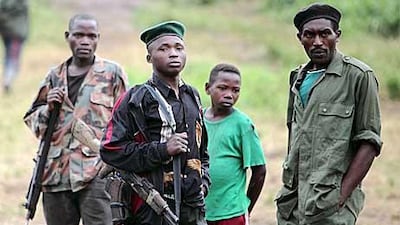NEW YORK // UN sanctions experts have praised new regulations in the UAE on the import of gold and other precious minerals that are aimed to help staunch the bankrolling of rebel groups in the conflict-ridden eastern Democratic Republic of Congo.
New trade rules from Dubai Multi-Commodities Centre (DMCC) will make it harder for armed groups in the DR Congo to profit by extracting gold and gems and selling them on the world market, experts said.
Sanctions monitors previously exposed an illicit flow of Congolese gold, worth US$1.24 billion (Dh4.5bn) each year by one estimate, which mostly passes through Burundi and Uganda before reaching the global trade hub of Dubai.
Rebel groups and Congolese national forces compete to control mines and mineral-rich areas, where they tax or regulate natural resources and use proceeds from their trade on world markets to buy more weapons.
"Within the UAE, the Dubai Multi-Commodities Centre is formulating guidelines on the due diligence it requests of its members with respect to knowing their clients and mitigating the risk of being a party to money laundering," the UN sanctions experts said in a report this week.
The sanctions experts, who met officials from DMCC, Dubai's free trade zone for precious metals and gems, and two private traders, Emirates Gold and Kaloti Jewellery, also urged the government to clamp down more broadly on gold importing.
The five-member team said UAE customs officials currently allow shipments of gold into the country with "minimal documentation" and without requiring importers to say where their metal was purchased or where it will be sold.
"The group considers that all regulatory authorities in the Emirates should adopt the same standard with regard to the due diligence required of gold importers and refineries [as the DMCC] and that those standards should be mandatory," the document said.
Previous reports describe Dubai-based traders arranging for couriers to bring gold-packed suitcases into the country via various African cities on airlines before the cargo is traded "anywhere in the gold souq".
UAE customs officials should require traders to provide more details and certificates relating to the supply chain of their gold shipments, including details of purchase and taxes in the source country, the experts said in a 191-page report.
On Monday, the UN Security Council endorsed the experts' report and unanimously adopted a resolution that extended an arms embargo, travel freeze and asset bans on people linked to illicit Congolese mineral trading.
Unlike previous resolutions on DR Congo, the 15-nation body this time supported new "due diligence" guidelines for the minerals industry that would require importers to tighten background checks on gold and other natural resources.
The resolution calls upon governments to urge importers, processors and industries to regulate the trade and make import figures public in order to "mitigate the risk of further exacerbating the conflict" in eastern DR Congo.
UAE diplomats were not available for comment.
Susan Rice, the United States ambassador to the UN, said the White House backed new guidelines for regulating the minerals trade and supported targeted sanctions against those who undermine DR Congo's stability.
"If implemented, these guidelines could significantly limit the illicit minerals trade, which has for many years fuelled violence in the DRC," she said.
Rebels ousted the long-time dictator Mobutu Sese Seko in 1997, and then turned on each other in back-to-back civil wars across a country the size of Western Europe, spawning cross-border scrambles for minerals that drew in soldiers from a half-dozen African nations.
Peacekeepers arrived in 1999 to observe a ceasefire and the withdrawal of foreign troops, but widespread conflict ensued until 2003 and claimed some 5.4 million lives. Conflict and contraband still yield misery in DR Congo's eastern provinces of North and South Kivu.
Human rights organisations say militant groups force villagers and even children into gold mines to toil, often without pay, using profits from DR Congo's estimated 40-tonne-a-year illicit trade to buy weapons, intimidate locals and wage war.
Daniel Balint-Kurti, an analyst for the London-based group Global Witness, which tracks resource-driven conflicts, said the UAE should enforce the UN guidelines and carry out audits and inspections to "find out where their materials are coming from".
"Global Witness also calls on the UN Security Council to impose targeted sanctions on companies that support armed groups in DR Congo through the illicit trade in metals such as gold," he said. "It is important that the UAE recommends any offending companies for sanctions, if the 'conflict minerals' problem is to be properly addressed."
"We welcome the UN's due diligence guidelines for gold and minerals companies, but regulators in the UAE must take stronger steps to trace, audit, and verify that conflict gold is not entering its market," added Sasha Lezhnev, an analyst for a Washington-based campaign group called the Enough Project. "It is in Dubai's interest to take regulatory action, as the world is now watching to see if gold that causes human misery is entering its supply chain."


